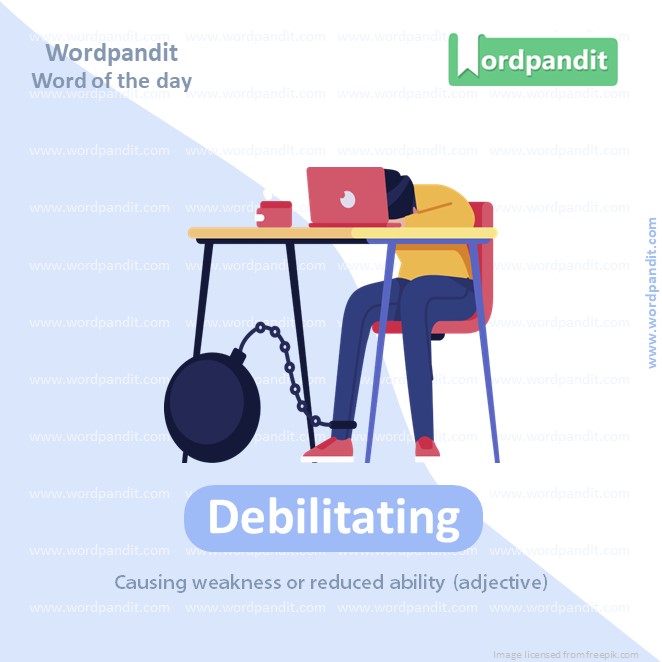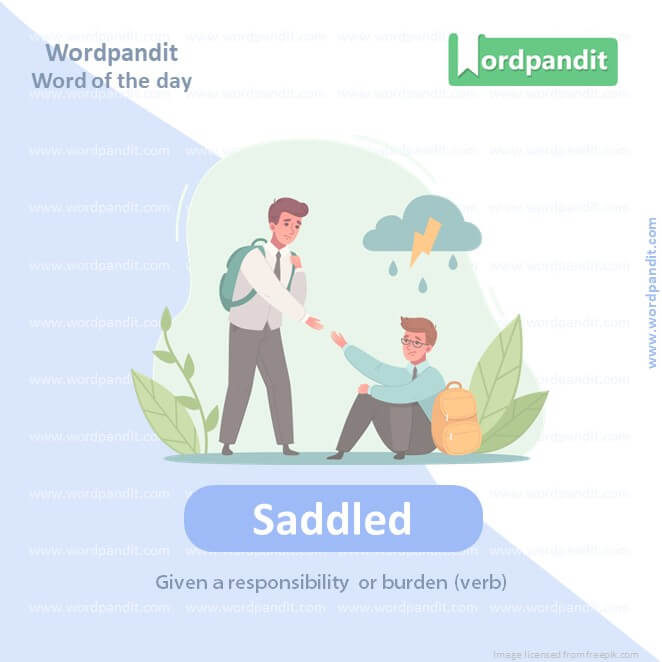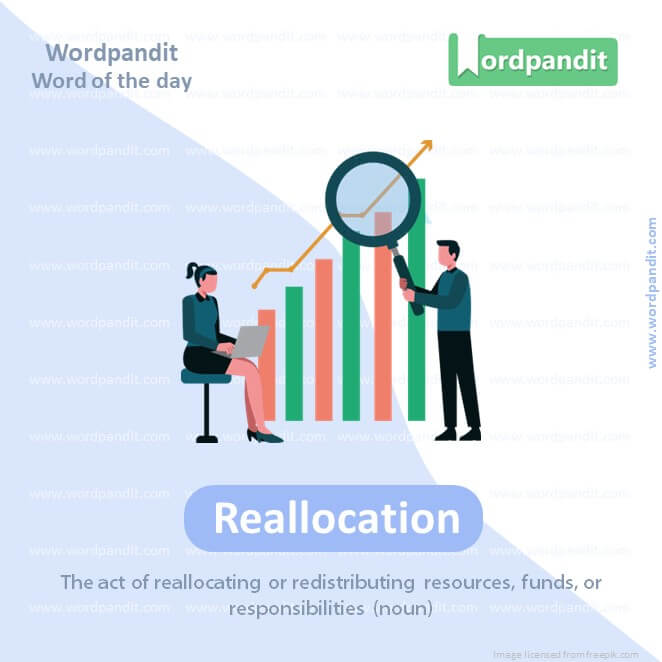Daily Vocabulary Words: List of Daily Used Words
Hi there. Welcome to this special section @ Wordpandit.
Our endeavour here is straightforward: highlighting important daily vocabulary words, you would encounter in The Hindu. This is your repository of commonly used words; essentially, we are posting a list of daily used words. Hence, this has significant practical application as it teaches you words that are commonly used in a leading publication such as The Hindu.
Visit the website daily to learn words from The Hindu.

WORD-1: Debilitating
CONTEXT: The global economy has avoided the spectre of a debilitating recession, with the IMF last week raising its forecast for worldwide aggregate growth in 2024 to 3.2%, from the 2.9% it had projected in October.
SOURCE: The Hindu
EXPLANATORY PARAGRAPH: Imagine something that weakens you or makes it hard for you to do things you normally do easily. That’s like “debilitating.” It means causing someone or something to become weak or feeble.
MEANING: Causing weakness or reduced ability (adjective).
PRONUNCIATION: dih-bil-i-tey-ting
SYNONYMS: weakening, enfeebling, impairing, crippling, incapacitating
USAGE EXAMPLES:
- The illness had a debilitating effect on his ability to work.
- The team faced debilitating challenges during the project.
- Financial constraints can be debilitating for small businesses.
- She struggled with a debilitating fear of public speaking.
WORD-2: Undergirding
CONTEXT: The IMF has underlined the fact that the global economy has, with surprising resilience, ridden out several adverse shocks as well as ‘significant central bank interest rate increases aimed at restoring price stability’ and sustained the growth momentum, largely on the back of advanced economies led by the U.S. undergirding demand.
SOURCE: The Hindu
EXPLANATORY PARAGRAPH: Imagine a strong foundation or support system that holds everything together. That’s like “undergirding.” It means providing a solid foundation or support for something.
MEANING: Providing a solid foundation or support for something (verb).
PRONUNCIATION: uhn-der-gur-ding
SYNONYMS: supporting, bolstering, buttressing, underpinning, reinforcing
USAGE EXAMPLES:
- The principles of fairness and equality undergirded their decision-making process.
- Trust and communication undergird a strong relationship.
- The scientific evidence undergirds the theory of climate change.
- Education serves as the undergirding for societal progress.

WORD-3: Saddled
CONTEXT: To compound their woes, these economies were now saddled with a mounting debt service burden that was severely impairing their ability to spend on vitally needed public goods including better ed
SOURCE: The Hindu
EXPLANATORY PARAGRAPH: Imagine carrying a heavy burden on your back that slows you down. That’s like being “saddled.” It means being burdened with responsibilities, problems, or difficulties.
MEANING: Given a responsibility or burden (verb).
PRONUNCIATION: sad-ld
SYNONYMS: burdened, loaded, encumbered, weighed down, afflicted
USAGE EXAMPLES:
- He felt saddled with debt after losing his job.
- The team was saddled with the task of completing the project on a tight deadline.
- The company was saddled with legal issues that affected its operations.
- She was saddled with caring for her elderly parents and managing her career.

WORD-4: Cognisance
CONTEXT: We have not taken cognisance of the many ways by which water flows through our economy and, instead, addressed water (and other natural resources) in silos. Water connects our hydrological, food, and energy systems, impacting millions of people.
SOURCE: The Hindu
EXPLANATORY PARAGRAPH: Imagine being aware of something, understanding it fully, and taking it into account. That’s like “cognisance.” It means awareness or understanding of something.
MEANING: Awareness, notice, or understanding of something; being conscious of what is happening (noun).
PRONUNCIATION: kog-nuh-zuhns
SYNONYMS: awareness, consciousness, recognition, perception, realization
USAGE EXAMPLES:
- The company acted with cognisance of the market trends.
- He showed cognisance of the risks involved in the venture.
- Cognisance of cultural differences is important in international relations.
- The report raised cognisance of the environmental impact of the project.

WORD-5: Rejuvenation
CONTEXT: the Atal Mission on Rejuvenation and Urban Transformation (AMRUT) 2.0 calls for reducing non-revenue water, which is lost before it reaches the end user, to less than 20% in urban local bodies.
SOURCE: The Hindu
EXPLANATORY PARAGRAPH: Imagine something old or tired becoming fresh, new, and full of energy again. That’s like “rejuvenation.” It means the act of making something or someone feel renewed, revitalized, and energetic.
MEANING: The process of making someone or something look or feel better,
younger, or more vital (noun).
PRONUNCIATION: ri-joo-vuh-ney-shuhn
SYNONYMS: renewal, revitalization, regeneration, revival, refreshment
USAGE EXAMPLES:
- The spa offered rejuvenation treatments for tired muscles and skin.
- A vacation by the beach brought a sense of rejuvenation and relaxation.
- The company underwent a process of rejuvenation to modernize its image.
- Yoga and meditation can provide mental and emotional rejuvenation.

WORD-6: Reallocation
CONTEXT: Research showed that six of the nine planetary boundaries are being crossed. ESBs plead for a radical reallocation of attention in the spectrum of education policies.
SOURCE: The Hindu
EXPLANATORY PARAGRAPH: Imagine moving resources or responsibilities from one place to another to make better use of them. That’s like “reallocation.” It means the act of reallocating or redistributing resources, funds, or responsibilities.
MEANING: The act of reallocating or redistributing resources, funds, or responsibilities (noun).
PRONUNCIATION: ree-uh-loh-key-shuhn
SYNONYMS: redistribution, reassignment, reorganization, transfer, relocation
USAGE EXAMPLES:
- The reallocation of funds allowed for increased investment in education.
- Reallocation of manpower helped improve efficiency in the department.
- The company announced a reallocation of resources to focus on innovation.
- Reallocation of tasks among team members led to better collaboration.
WORD-7: Emplaced
CONTEXT: To create learning spaces emplaced in the local living world comes with more challenges than mere text-based climate literacy.
SOURCE: The Hindu
EXPLANATORY PARAGRAPH: Imagine putting something in a specific position or location, like placing puzzle pieces in the right spots. That’s like “emplaced.” It means to put something in a particular place or position, especially in a strategic or organized manner.
MEANING: To put something in a particular place or position, especially in a strategic or organized manner (verb).
PRONUNCIATION: em-pleyst
SYNONYMS: positioned, located, situated, installed, arranged
USAGE EXAMPLES:
- The troops were emplaced along the border for surveillance.
- Security cameras were emplaced throughout the building for monitoring.
- Sensors were emplaced to detect any unauthorized access.
- The strategic plan emplaced new policies to improve efficiency.
WORD-8: Succinctly
CONTEXT: Rarely has social media summed up a situation so succinctly. According to the Urban Dictionary, the noun Israel ‘got israeled’ as a verb to mean when someone is asked to share something of yours, then claims it as their own, and takes it for themselves.
SOURCE: The Hindu
EXPLANATORY PARAGRAPH: Imagine saying something in a very brief and clear way, without unnecessary details. That’s like “succinctly.” It means expressing something concisely and clearly, without elaboration or excess words.
MEANING: Expressing something concisely and clearly, without elaboration or excess words (adverb).
PRONUNCIATION: suhngk-tly
SYNONYMS: concisely, briefly, tersely, to the point
USAGE EXAMPLES:
- He explained the concept succinctly in just a few sentences.
- The summary of the report succinctly captured the key findings.
- She answered the question succinctly and directly.
- The speaker delivered the message succinctly to keep the audience engaged.
WORD-9: Meandering
CONTEXT: The Arab states, after much meandering, developed a common position in the Arab League Declaration/Initiative of March 2002.
SOURCE: The Hindu
EXPLANATORY PARAGRAPH: Imagine a river flowing in curves and bends instead of a straight line. That’s like “meandering.” It means to follow a winding and indirect course, often without a clear direction or purpose.
MEANING: Following a winding and indirect course, often without a clear direction or purpose (adjective).
PRONUNCIATION: mee-an-der-ing
SYNONYMS: winding, circuitous, indirect, rambling, wandering
USAGE EXAMPLES:
- The meandering river passed through picturesque landscapes.
- His speech was meandering and lacked a clear focus.
- The meandering path through the forest was serene and calming.
- The novel took readers on a meandering journey through the character’s thoughts.
WORD-10: Exorcising
CONTEXT: the main obstacles to a solution have to do with exorcising the past, admitting past and present injustice for one side; forgiving the past, and the present for the other.
SOURCE: The Hindu
EXPLANATORY PARAGRAPH: Imagine removing something evil or unwanted from a place, like banishing ghosts or spirits. That’s like “exorcising.” It means to get rid of something harmful, unpleasant, or unwanted, especially through a ritual or forceful action.
MEANING: Getting rid of something harmful, unpleasant, or unwanted, especially through a ritual or forceful action (verb).
PRONUNCIATION: ek-sawr-sahyz-ing
SYNONYMS: banishing, expelling, purging, removing, eliminating
USAGE EXAMPLES:
- She felt like she was exorcising her fears by facing them head-on.
- The community worked together to exorcise negative influences from their neighborhood.
- The ritual was believed to exorcise evil spirits from the haunted house.
- He wrote about his experiences as a way to exorcise the memories of war.
Vocabulary Daily Words
Among the myriad aspects of language learning, the role of ‘vocabulary daily words’ attests to their undeniable importance. These everyday words form the bedrock of communication. Whether used in casual chat or formal discussion, the fluency and understanding of ‘vocabulary daily words’ can significantly uplift the quality of interaction. However, the vital question is, how to effectively learn these ‘vocabulary daily words’?
The crux of learning ‘vocabulary daily words’ lies in a well-rounded approach that encompasses exposure, understanding, memorization, and practice. Rote memorization might seem like a quick solution, but it lacks context and, thereby, retention. Hence, opt for a diverse range of resources like books, newspapers, podcasts, and digital media. These will bring ‘vocabulary daily words’ to life, providing real-life usage examples and making the learning process inherently engaging.
Next, using memory-enhancing techniques can significantly improve retention of ‘vocabulary daily words’. Techniques such as flashcards or the Leitner System align with the principles of spaced repetition, allowing more effective and long-term learning. Incorporating mnemonic devices, associating new words with unique stories or images, can further facilitate this learning process.
The key to fully grasping ‘vocabulary daily words’ lies in practical usage. Make it a habit to use these words in your daily communications. Whether it’s a friendly conversation, a professional email, or a social media post, try integrating these new words. Doing so provides hands-on practice, strengthening your comprehension and application of these words.
In a nutshell, ‘vocabulary daily words’ are a treasure in the language learning landscape. By harnessing diversified resources, utilizing memory techniques, and actively using these words, your grip on the ‘vocabulary daily words’ will strengthen significantly. So, turn the pages, hit play, start a conversation, and let these ‘vocabulary daily words’ shape the story of your linguistic journey.











